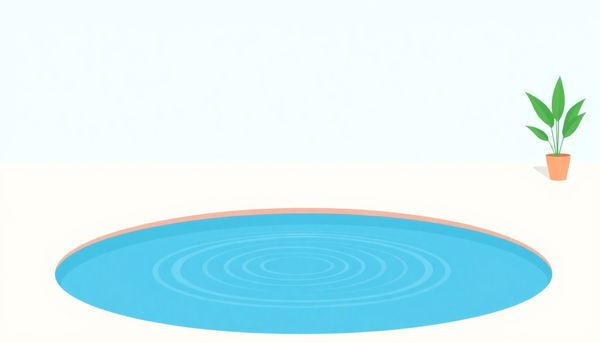Eco-Friendly Mineral Systems for Easy Pool Maintenance
June 30th, 2024
June 30th, 2024
Splashing into the world of pool maintenance can feel overwhelming, especially when bombarded with options for keeping that oasis clean and sparkling. Among these choices, pool mineral systems stand out as a whisper of innovation. Have you ever chatted with a friend who swears their pool requires less upkeep than most? Chances are, they may have discovered the secret of minerals.
Unlike traditional chlorine-heavy methods, mineral systems employ a blend of natural elements like silver and copper to purify the pool water gently. These systems harmonize with the water, reducing the need for harsh chemicals and providing a softer, more pleasant swimming experience. On a summer afternoon, as the sun glistens off the water’s surface, wouldn't it be nice to know your pool is not only beautiful but also eco-friendly?
From the technical inner workings to the simple pleasure of a refreshing swim, understanding pool mineral systems opens up a world of benefits. Friends and family who visit often remark on the smoothness of the water, and there's a certain peace of mind in knowing it's all maintained with minimal effort. Whether you're a seasoned pool owner or new to the game, this guide will illuminate the nuances of mineral systems, making the path to pristine waters clearer than ever.

The sun is blazing, the pool is sparkling, and the scent of chlorine is conspicuously missing. That's because you've tapped into the secret of pool mineral systems. These systems offer a gentle alternative to the traditional chemical approach, providing a swim experience akin to stepping into a natural spring. So why do so many pool aficionados sing the praises of these mineral marvels?
To start, the skin often bears the brunt of harsh chemicals. Chlorine, though effective, can leave skin feeling parched and irritated—a sensation reminiscent of winter winds rather than summer fun. With pool minerals, the story shifts. Pools treated with minerals such as silver and copper create a soothing swim environment, leaving skin silky and hair soft. It's akin to upgrading from a scratchy bath towel to a plush spa robe.
Moreover, there's the matter of maintenance. Pool equipment—pumps, filters, and liners—doesn't escape chlorine's corrosive touch. By incorporating minerals, which are less abrasive, your gear enjoys a longer lifespan, saving you from frequent replacements and the headaches they bring. This subtle touch does wonders not just for your swim but also for your wallet.
Finally, the appeal of reduced chemical use is undeniable. By leaning on the natural cleaning power of minerals, you cut down on chlorine—by up to 50%—and say goodbye to the notorious "pool smell." Plus, maintenance becomes less of a chore, giving you more time to enjoy your pool rather than fret over it. In essence, embracing pool mineral systems isn't just about healthier water; it's about transforming your entire aquatic experience.
There's nothing quite like slipping into a pool where the water feels gentle against your skin, akin to the soothing touch of velvet. For those who have endured the prickly aftermath of a chlorine-drenched dip, the allure of a pool mineral system is hard to resist. Unlike traditional methods that leave skin parched and hair brittle, mineral-treated water offers a hydrating embrace. The secret lies in clever chemistry—silver and copper team up to combat unwanted guests like bacteria and algae, while other elements like zinc contribute to a nurturing environment.
Let’s not forget the unsung heroes of our pool equipment. Pumps and filters, relentlessly working, benefit immensely from the softer touch of mineral-treated water. Chlorine, though effective, can be harsh over time. Imagine the wear and tear avoided when components are spared the relentless assault of harsh chemicals. It's like giving your pool’s inner workings a well-deserved spa day.
And then there's the practical side: reduced chemical use means fewer trips to the store and less handling of potentially hazardous substances. Less chlorine also translates to fewer chloramines, those familiar culprits behind the notorious "pool smell." Whether you're chasing after cost savings, kinder water, or environmental benefits, embracing a pool mineral system might just be the refreshing change you—and your pool—have been seeking.
In the world of pool care, where maintenance often feels like a never-ending chore, easy-maintenance options can be a refreshing revelation. A friend of mine, tired of the constant juggle with chemical levels, discovered the magic of pool mineral systems and hasn’t looked back since. These systems are specifically designed to simplify the upkeep of a pool while maintaining its health with minimal hassle.
One of the most appealing aspects is the effortless application. Whether it’s an in-skimmer unit or a floating dispenser, these systems integrate seamlessly into your existing setup. The process involves no complex tools or technical know-how, which means even the least DIY-savvy among us can handle installation without breaking a sweat. This simplicity allows pool owners to enjoy more swim time and less maintenance time, a benefit anyone can appreciate.
Beyond their ease of use, pool mineral systems significantly reduce the need for harsh chemical treatments. By minimizing the reliance on chlorine or bromine, they not only cut down on chemical costs but also prevent the typical wear and tear these chemicals can cause to pool equipment. This means fewer repairs and replacements down the line, which is a relief for anyone who has faced unexpected pool expenses.
For anyone seeking to lighten their maintenance load without sacrificing pool health, mineral systems offer an enticing solution. They promise a cleaner, softer swimming experience and a more sustainable approach to pool care, all while keeping your pool sparkling with minimal effort.
Sun-drenched afternoons at the pool are timeless, but while you're enjoying a refreshing dip, your pool and its equipment might be silently crying out for care. Mineral systems offer an elegant solution to protect and preserve both your pool's water quality and its underlying infrastructure. Much like choosing the right diet to fend off illness, a pool mineral system guards against the wear and tear inflicted by harsh chemicals like chlorine.
Consider your pool's pump and filter—the unsung heroes working tirelessly behind the scenes. Constant exposure to chlorine doesn’t just erode surfaces; it can diminish efficiency over time. Mineral systems, leveraging the gentle but powerful properties of silver and copper, present a kinder alternative. Silver wards off bacteria, while copper tackles algae, allowing your equipment to operate in a less corrosive environment.
While I once balked at the initial cost, the switch to minerals for my own pool was a revelation. The reduction in chlorine use not only eased maintenance efforts but also extended the lifespan of my pump and filter. Plus, the absence of that overpowering chlorine scent was a welcome change. The decision to invest in a mineral system ultimately gifted me with peace of mind, knowing that my pool—and the equipment it relies upon—is in good hands, enduring year after year with minimal fuss.

Keeping a pool pristine can often feel like juggling too many tasks at once, but pool mineral systems offer a refreshing simplification. I remember my friend Sarah's pool maintenance woes—her weekends were consumed by balancing chemicals and scrubbing tiles. Then, she discovered pool mineral systems, and everything changed.
You see, these systems work by harnessing the natural powers of silver and copper, much like how the Romans utilized silver's antibacterial properties centuries ago. Silver keeps bacteria at bay, while copper doubles as a powerful algaecide. With these minerals, the need for high chlorine levels diminishes, effortlessly resulting in softer, more inviting water. Not only does this mean gentler swims and longer-lasting swimsuits, but it also extends the life of pool equipment by reducing chemical wear and tear.
Another aspect that Sarah appreciated was the ease of installation and upkeep. These systems don't require complex setups; a simple drop-in unit can start making a difference. The maintenance is straightforward, too—no more endless measuring or frequent chemical adjustments. It's like giving your pool a self-cleaning mechanism that lets you reclaim your weekends.
In a world where time is precious, embracing a pool mineral system can transform how you enjoy your pool, making maintenance less of a chore and more of a background task. It's worth considering for anyone seeking a simpler, more natural way to keep their pool sparkling clean.
Swimming need not be a battle against harsh chemicals. For those weary of chlorine's drying effects, mineral-based sanitizers offer a refreshing alternative. Imagine stepping out of your pool without the usual tight skin and straw-like hair, all thanks to the gentle touch of mineral-treated water. Silver and copper, the stars of this sanitizing show, have been trusted since ancient times for their antibacterial and anti-algae prowess, respectively. Their magic lies in maintaining a clear pool without the abrasive side effects of traditional chemicals.
Transitioning to a mineral system is not only about the comfort it offers swimmers but also about the longevity it grants your pool equipment. Chlorine can be brutal on pumps and filters over time, but with softer water, your pool components endure less wear and tear. This can translate into significant savings on maintenance and replacements, something any pool owner can appreciate.
While the initial investment in a mineral system might seem daunting, remember that it reduces the need for chlorine, cutting costs in the long run. However, it's essential to use a complementary chemical occasionally to ensure comprehensive sanitation. Despite the mineral system's prowess, it can't entirely eliminate the need for a bit of chlorine or bromine. With the right balance, your pool can become an oasis of clean, inviting water, free from the overpowering scent of traditional chemicals. Why not explore the mineral path and transform your swimming experience into something truly luxurious?
In the world of pool maintenance, equipment longevity plays a vital role in ensuring smooth operations and reducing unexpected expenses. A key factor in this longevity is the quality of the water that flows through your pool systems. Softer water, achieved through pool mineral systems, can be a game-changer for your pool's health and the preservation of its components.
Imagine owning a pool where pumps and filters glide through their tasks effortlessly, as opposed to battling harsh, mineral-rich water. Traditional sanitization methods, such as chlorine, often leave deposits and encourage scale buildup on your pool equipment. This buildup can lead to wear and tear, causing components to age prematurely. Switching to a mineral-based system minimizes such risks by softening the water, thereby reducing the abrasive impact on your equipment.
Take, for instance, a friend who made the transition from a chlorine-heavy setup to a mineral system. Not only did they notice a marked improvement in their pool's clarity, but their maintenance bills also saw a decline. The mineral system required less frequent replacement of parts and fewer repairs, showing clear benefits in both performance and cost.
By opting for softer water, you're not just making a choice for cleaner swimming but also for extending the life of your pool's infrastructure. In the long run, your pool will thank you, operating efficiently while saving you both time and money.
Once upon a time in the world of pool maintenance, reducing chemical usage was like trying to cook without a recipe. Messy, unpredictable, and often resulting in a less-than-desirable outcome. But with pool mineral systems, owners can now streamline their approach and minimize chemical dependency without sacrificing cleanliness. Whether it's the gentle touch of silver fighting bacteria or copper doing battle with algae, these minerals provide a natural way to maintain pristine waters.
Think about your skin after a swim. Chlorine leaves it dry and parched, not unlike an all-day sunbathing session without sunscreen. Minerals, on the other hand, offer a soft, smooth touch, almost like the gentle embrace of a favorite moisturizer. They reduce the need for high chlorine levels, slashing your usage by up to 50%. It’s not just a win for your skin, but also for your wallet, as buying fewer chemicals translates into significant savings over time.
And here's a tip for the cautious: begin with an easy-to-use in-skimmer or floating device to test the waters, quite literally, without any drastic changes. You’ll experience fewer harsh odors and possibly extend the lifespan of your pool equipment as it faces less chemical corrosion. Embrace this efficient approach, and you might find that the once-daunting task of pool maintenance becomes as relaxing as a lazy afternoon float.

Long summer days spent poolside are often marred by the harsh reality of post-swim dryness. Anyone who’s ever left a chlorinated oasis with parched skin and hair knows the struggle. Pool mineral systems might just be the balm for this common woe, transforming your swimming experience into something far gentler.
Imagine dipping into water that feels as smooth as silk. This isn’t just a pool owner’s daydream; it’s the result of incorporating minerals like silver and copper into your pool’s regimen. By using these natural elements, the water becomes noticeably softer, caressing your skin and leaving your hair free from that dreaded straw-like texture. Have you ever noticed how your favorite swimsuit dulls over time? Mineral systems significantly reduce this fading phenomenon, sparing your swimwear from chlorine’s bleaching grip.
The advantages extend beyond just personal comfort. Your pool’s hardware—pumps, filters, and other essential equipment—benefits from this gentler approach as well. The softened water exerts less stress on these components, potentially extending their lifespan and ensuring they function more efficiently. Just as you’d opt for a snug pair of shoes that last for years, your pool deserves care that minimizes wear and tear.
Choosing a pool mineral system isn’t merely about enhancing water softness; it’s a holistic approach to pool maintenance that respects both you and your investment. Embrace the change, and let your pool become the sanctuary it was always meant to be.
Mineral-based sanitizers offer a refreshing twist on traditional pool care, inviting swimmers into a world where water feels silkier and maintenance becomes a breeze. Unlike the often harsh embrace of chlorine, mineral systems employ the natural cleaning powers of silver, copper, and sometimes zinc. These elements have been trusted for centuries, dating back to the Romans who cherished silver for its antibacterial properties. Copper, an effective algaecide, plays its part by ensuring your pool remains free from that pesky green intruder.
Switching to a mineral-based system could mean saying goodbye to the heavy scent of chlorine and its drying effects on skin and hair. Many pool owners, much like my neighbor who swears by her mineral system, appreciate how the water feels on their skin, akin to the gentle whisper of a mountain spring. The benefits extend beyond personal comfort. Pool equipment, too, can enjoy a longer lifespan, as softer water reduces the wear and tear typically caused by harsher chemicals.
Of course, like any good story, there's another side to consider. While minerals decrease the amount of chlorine needed, they don't entirely eliminate its necessity. To fully sanitize, a balance must be struck with small doses of chlorine or bromine. Moreover, be mindful of potential copper stains in your pool, especially if your water source contains high levels of the metal. Despite these minor hurdles, mineral-based systems present an enticing alternative for those seeking a gentler, more natural pool experience.
Stepping into a pool should be a refreshing experience, not an assault on your senses. Many pool owners are familiar with the itchy skin, dry hair, and faded swimsuits that often result from chlorine-laden waters. Imagine, instead, diving into water that feels as smooth as silk against your skin. That’s the promise of pool mineral systems, which employ minerals like silver and copper to soften water, reducing the reliance on harsh chlorines.
In my own backyard, switching to a mineral system was like night and day. The water felt different—softer, almost luxurious. Adjusting to this new system was straightforward, and the benefits were immediate: no more chlorine smell, no more red eyes. My kids noticed too, often commenting on how their skin felt after a swim. With less chlorine needed, not only did the pool water become gentler on our skin, but the wear and tear on the pool equipment decreased noticeably. This transition not only extends the life of pumps and filters but also keeps maintenance costs in check.
Pool mineral systems aren't just about the feel; they also contribute to the longevity of your pool and accessories. By minimizing chlorine usage, you spare your pool infrastructure from the relentless assault of chemicals, preserving its condition. As someone who values both comfort and efficiency, adopting a mineral system felt like the wisest move for both my family and my pool.
Stepping into the world of pool maintenance can feel like navigating a maze, especially when you're trying to dodge unsightly stains that seem to pop up out of nowhere. It’s a common woe for pool owners, but there are ways to keep your pool pristine with the help of mineral systems. You might think of copper and silver as the dynamic duo here, working together to keep your pool not only clear but also stain-free.
Copper, known for its algaecidal properties, is a star player in many mineral sanitizers. However, it’s also the culprit behind those dreaded green stains if it oxidizes in your pool water. The trick? Regularly test your water’s metal content and use hose filters when filling the pool to limit copper intake from the start. My neighbor swears by his routine of a monthly metal sequestrant treatment after suffering through a season of stubborn stains. It was a game-changer for him.
Silver, on the other hand, acts as an antibacterial agent, quietly working in the background to fend off bacteria. This means less reliance on high levels of chlorine, which not only keeps the water clearer but is also gentler on your pool surfaces. By maintaining a balanced mineral system, you not only prevent stains but also prolong the life of your pool equipment. Stains might be a nuisance, but with the right approach, they don't stand a chance.

Selecting the ideal pool mineral system requires more than just a quick glance at the options. It's a bit like choosing the right vitamin blend for your health—what works wonders for one pool might not be the best for another. So, how do you determine which system will keep your pool sparkling without the harshness of traditional chemicals?
Start by considering your pool's unique needs. If you've been fighting off algae invasions every summer, a system rich in copper might be your ally, as copper is a renowned algaecide. On the other hand, if you're more concerned with bacteria, silver's antibacterial prowess could be what you need. Reflect on your past pool challenges—what issues have consistently demanded your attention?
Also, think about maintenance. Some systems offer the convenience of a simple floating dispenser, which is perfect for those who prefer minimal fuss. Others might require a bit more involvement, connecting directly to your pool's plumbing for a seamless operation. Are you a hands-on pool owner, or do you prefer a set-it-and-forget-it approach?
Lastly, ponder the long-term health of your pool and its components. Mineral systems can extend the life of your pool equipment by providing gentler water. As you weigh your options, consider not just the immediate benefits, but also how each choice will impact your pool's longevity and your maintenance routine over time.
A plunge into understanding pool mineral systems reveals a world where chemistry meets comfort. Imagine swimming in a pool that feels as gentle on your skin as a summer breeze. That's the allure of pool mineral systems. Unlike traditional methods, these systems utilize the natural properties of minerals like silver and copper, known for their antibacterial and algaecidal prowess respectively, to maintain a pristine aquatic environment.
Think back to the Romans who relied on silver's purifying power or the modern algaecide formulations infused with copper. These time-tested elements now grace your pool, offering a more natural approach to water care. Silver fends off bacteria, while copper tackles algae, ensuring a clean swim without harsh chemicals. Some systems even feature zinc and limestone, contributing to a balanced pH and further bacterial defense.
Mineral systems provide a tactile difference as well. Swimming becomes an experience where the water feels soft and soothing, preserving the vibrancy of your swimsuit and the health of your skin and hair. There's also the long-term financial angle; less wear and tear on your pool equipment thanks to reduced chemical exposure means fewer repairs and replacements.
However, the mineral approach isn't a standalone solution. To keep your pool impeccably clean, a modest amount of chlorine or bromine is still necessary. As you explore these options, consider the blend of benefits—softer water, less chemical odor, and the historical backing of nature's own sanitizers. Your pool’s future might just shimmer with minerals.
Choosing the right pool mineral system can feel like navigating a maze of options, each offering distinct advantages for maintaining your aquatic haven. Much like selecting the perfect shade of paint for your living room, the choice of a pool mineral system depends on your specific needs and preferences. First, consider the immediate benefits. Mineral systems often provide a gentler experience for swimmers; the water's silky texture is a noticeable change from the crisp bite of a chlorine-laden pool. My friend Sarah, for instance, switched her backyard oasis to a mineral system last summer. Her kids now swim for hours without the itchy skin and red eyes that used to cut playtime short.
However, it’s essential to balance the perks with practical considerations. While mineral systems can reduce chlorine usage, they don't entirely eliminate the need for it. Think of them as a trusty sidekick rather than a solo hero. The initial cost might be another factor to weigh. Though mineral systems boast a longer lifespan, the upfront investment might be steeper compared to traditional methods. Yet, for many, the long-term savings in reduced chemical purchases and equipment wear outweigh initial costs.
Most importantly, assess the compatibility with your existing pool setup. If you're handy with tools, a more integrated system might be a viable DIY project. Otherwise, simpler solutions like floating dispensers provide hassle-free installation. Ultimately, choosing your pool's mineral system is about finding harmony between budget, convenience, and swimmer comfort—a trio that can make your pool the neighborhood envy.
Switching to a mineral sanitizer system for your pool can feel like a breath of fresh air, especially for those weary of the traditional chlorine swim. The transformation isn’t as daunting as it might seem; in fact, it enhances your swimming experience while potentially saving some dollars in the long run. A friend once shared the tale of his first mineral pool dip. He described the water as a soft embrace, lacking the sharp chemical scent and the skin-tightening aftermath of chlorine. It was as if the pool itself had turned into a gentle spa.
Mineral systems primarily employ silver and copper, elements with a rich history of purification. Silver's antibacterial prowess dates back to ancient Rome, while copper excels as an algaecide. Together, they form a formidable duo, keeping your pool clear without the harshness of conventional methods. Additionally, minerals soften the water, sparing your swimwear from fading and your skin from dryness.
But, like a well-planned diet, balance is crucial. Relying solely on minerals won't fully sanitize your pool; a small amount of chlorine or bromine is still necessary. Also, be mindful of potential staining from copper—using a hose filter when filling your pool can help mitigate this. Once you've considered these aspects, introducing a mineral system can be as simple as placing a dispenser in your skimmer or letting one float leisurely, gently scattering minerals into your oasis of relaxation.

Floating in a pool clouded with chlorine fumes is less than ideal. The lingering scent, paired with the dryness it imparts on skin and hair, can turn a refreshing swim into a bothersome ordeal. Transitioning to a pool mineral system can significantly curb this dependency on chlorine, offering a more pleasant swimming experience with numerous benefits.
First, consider the impact on your body. Swimming in mineral-treated water feels noticeably different; the water takes on a softer, silkier texture that many find more enjoyable. This is a stark contrast to the harshness of chlorine, which often leaves swimmers with dry, itchy skin and brittle hair. Plus, the vibrant hues of your swimwear will remain vivid, unbleached by chlorine’s aggressiveness.
Moving on to pool equipment, a mineral system is gentler on your pool’s infrastructure. Chlorine can be corrosive over time, gradually degrading your pump, filter, and other components. By reducing your chlorine usage, mineral systems extend the lifespan of your equipment, potentially saving significant maintenance costs.
Moreover, the financial aspect can't be overlooked. While an initial investment in minerals is necessary, they allow you to use less chlorine overall, balancing out expenses. Some might even find it more economical in the long run, especially if considering the reduced repair costs for pool components.
In this way, a pool mineral system not only enhances your swimming experience but also offers practical benefits that go beyond just the water itself.
Stepping into the realm of pool mineral benefits is akin to discovering a new, refreshing way to enjoy your aquatic oasis. Friends often compare taking the plunge to a spa experience at home, with water that soothes rather than irritates. Picture a pool where the usual dryness and harshness associated with chlorine are replaced by a gentle embrace, leaving your skin smooth and your hair soft. This transition doesn't just enhance your swimming experience; it preserves your pool gear, extending the life of your swimsuits and pool equipment.
The secret lies in the natural properties of minerals like silver and copper. Silver, with its age-old antibacterial reputation, teams up with copper's algae-fighting prowess to keep pool water pristine without the heavy reliance on chlorination. Zinc and limestone also join the mix, stabilizing pH levels and ensuring a balanced aquatic environment. This combination reduces the notorious “pool smell” and allows you to cut down on chlorine use, which is a win-win for both health and wallet.
While a mineral system alone can't completely replace chlorine or bromine, its complementary role is invaluable. It mitigates some of the downsides of traditional pool chemicals, offering a harmonious balance. For those considering a switch, starting with a trial run using an in-skimmer or floating mineral dispenser is an easy way to test these waters. Once you feel the silky embrace of mineral-treated water, you might find it hard to return to the old ways.
Swapping out traditional pool sanitizers for mineral systems can be a game-changer in the realm of pool maintenance. My friend Sarah recently made the switch after years of battling harsh chemicals, and she's been singing its praises ever since. Her hair no longer resembles a brittle scarecrow's, and her skin feels like it spent an afternoon indulging in a spa retreat, rather than a chlorine assault.
Mineral-sanitizer systems typically incorporate silver and copper, known for their formidable antibacterial and algae-fighting properties. Unlike the common chlorine approach, these minerals provide a gentler touch, reducing the roughness in water that can damage swimsuits and lead to wear and tear on pool equipment. Sarah’s filtration system now seems to work as if it's had a rejuvenating overhaul, all thanks to the softened water.
However, before you leap into this mineral embrace, consider the necessary cooperation with small amounts of chlorine or bromine to ensure complete sanitation. The dance between minerals and minimal chemicals keeps bacteria at bay, while simultaneously preserving the delightful feel of the water. For a seamless transition, in-skimmer or floating dispensers offer an easy setup. Sarah opted for a floating system that alerts her when it’s time to replace the cartridge, making the whole process as breezy as a summer swim. This clever integration of minerals might just be the upgrade your pool has been waiting for.

This article provided insights into maintaining your pool. Start your pool care journey today!
Want to become a pool maintenance expert? Our free Pool School course covers everything you need to know about pool care. From basic maintenance to advanced troubleshooting, you'll learn how to:
Join over 10,000 pool owners who have already transformed their pool care routine. Get started with our free Pool School course today!